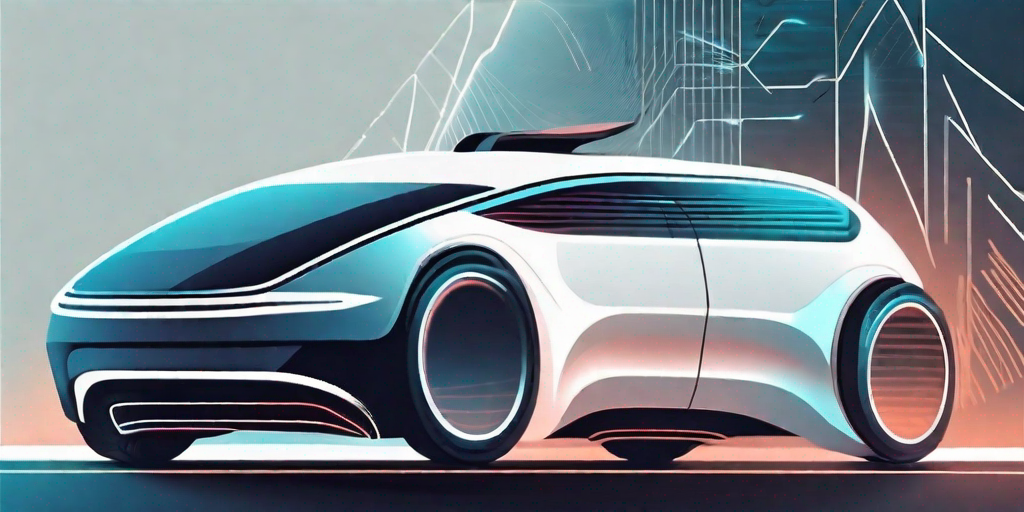Understanding Autonomous Vehicles with an Innovation Speaker's Help

Understanding Autonomous Vehicles with an Innovation Speaker's Help
Technology continues to evolve at an astonishing pace, revolutionizing various aspects of our lives. One area that has seen tremendous advancements is the transportation industry. Among these advancements, the emergence of autonomous vehicles has captured the imagination of the world. Whether it's the promise of increased safety on the roads or the potential for reshaping urban landscapes, autonomous vehicles are undeniably fascinating.
Understanding the Concept of Autonomous Vehicles
Before delving deeper into the topic, let us first define what autonomous vehicles are. Autonomous vehicles, also known as self-driving cars, refer to vehicles that can operate without human input. These groundbreaking machines utilize a combination of sensors, cameras, and artificial intelligence (AI) algorithms to navigate roads and make decisions.
What sets autonomous vehicles apart from traditional automobiles is their ability to perceive the surrounding environment and respond accordingly. This includes recognizing and interpreting road signs, detecting obstacles, and even predicting potential collisions. By effectively eliminating human error, autonomous vehicles have the potential to significantly reduce accidents and save countless lives.
Autonomous vehicles have the potential to revolutionize transportation as we know it. Imagine a future where commuting becomes a stress-free experience, where you can relax and enjoy your morning coffee while your car effortlessly navigates through traffic. With autonomous vehicles, traffic congestion could become a thing of the past, as these vehicles are designed to communicate with each other and optimize traffic flow.
One of the key benefits of autonomous vehicles is their potential to increase accessibility for individuals with disabilities or limited mobility. These vehicles have the capability to provide transportation solutions for those who are unable to drive themselves, allowing them to regain their independence and participate more fully in society.
However, the development and implementation of autonomous vehicles also raise important ethical and legal considerations. Questions arise regarding liability in the event of accidents, as well as the potential for hacking and cybersecurity threats. Striking the right balance between innovation and safety is crucial to ensure the successful integration of autonomous vehicles into our society.
Furthermore, autonomous vehicles have the potential to disrupt various industries. The transportation sector, for instance, may undergo significant changes, with the rise of ride-sharing services and the potential decline in car ownership. Additionally, the insurance industry may need to adapt to the new landscape of autonomous vehicles, as the risk landscape and liability models shift.
Research and development in the field of autonomous vehicles are progressing rapidly. Major automotive companies, as well as technology giants, are investing heavily in this technology, aiming to bring fully autonomous vehicles to the market in the near future. However, there are still several challenges to overcome, such as ensuring the safety and reliability of these vehicles in various weather conditions and complex urban environments.
In conclusion, autonomous vehicles have the potential to revolutionize transportation, improve road safety, and increase accessibility. However, their implementation requires careful consideration of ethical, legal, and societal implications. As technology continues to advance, it is important to strike a balance between innovation and safety to ensure the successful integration of autonomous vehicles into our daily lives.
The Role of an Innovation Speaker in Simplifying Autonomous Technology
While the concept of autonomous vehicles may seem complex, the role of an innovation speaker becomes crucial in simplifying this technology for the general public. Innovation speakers are experts in their respective fields who possess the unique ability to convey complex ideas in an accessible and engaging manner.
These speakers play a vital role in bridging the gap between cutting-edge technology and everyday people. By utilizing their knowledge and expertise, they can break down complex concepts surrounding autonomous vehicles into easily digestible information. Through captivating presentations and thought-provoking discussions, innovation speakers empower individuals to better understand and appreciate the potential of autonomous vehicles.
One of the key challenges in understanding autonomous technology is the intricate network of sensors and algorithms that enable a vehicle to navigate and make decisions on its own. Innovation speakers, with their deep understanding of these technologies, can provide detailed explanations of the different components involved in autonomous vehicles.
For instance, an innovation speaker may explain the role of LiDAR (Light Detection and Ranging) sensors in creating a 3D map of the vehicle's surroundings. They can delve into the technical aspects of how these sensors emit laser pulses and measure the time it takes for the pulses to bounce back, enabling the vehicle to detect and avoid obstacles.
Furthermore, innovation speakers can shed light on the advanced algorithms that analyze the data collected by the sensors. They can explain how these algorithms process information in real-time, allowing the vehicle to make split-second decisions, such as when to accelerate, brake, or change lanes.
Another aspect that innovation speakers can address is the safety measures implemented in autonomous vehicles. They can discuss the redundant systems and fail-safe mechanisms that ensure the vehicle operates reliably and minimizes the risk of accidents. By providing insights into these safety features, innovation speakers can alleviate concerns and build trust in autonomous technology.
In addition to technical details, innovation speakers can also explore the broader implications of autonomous vehicles. They can discuss the potential benefits, such as reduced traffic congestion, improved fuel efficiency, and increased accessibility for individuals with disabilities or limited mobility.
Moreover, innovation speakers can address the ethical and legal considerations associated with autonomous technology. They can engage the audience in discussions about the ethical dilemmas faced by autonomous vehicles, such as the trolley problem, where the vehicle must make a decision that may result in harm to different parties. By raising these thought-provoking questions, innovation speakers encourage critical thinking and a deeper understanding of the complex issues surrounding autonomous technology.
Overall, the role of an innovation speaker in simplifying autonomous technology is invaluable. They have the ability to break down complex concepts, explain technical details, and explore the broader implications of autonomous vehicles. Through their engaging presentations and discussions, innovation speakers empower individuals to embrace and appreciate the potential of this transformative technology.
The Future of Transportation: Autonomous Vehicles
The future of transportation undoubtedly lies in the realm of autonomous vehicles. As technology continues to advance, self-driving cars are expected to become more integrated into our everyday lives. The possibilities are endless, with implications that extend far beyond personal transportation.
Imagine a city where traffic congestion is reduced, accidents are rare, and parking is no longer a hassle. Autonomous vehicles have the potential to transform urban landscapes by optimizing traffic flow and improving efficiency. Additionally, the convenience of being able to work, relax, or even catch up on sleep while commuting is a prospect that many find appealing.
But what about the impact on the environment? With autonomous vehicles, we have the opportunity to significantly reduce carbon emissions and combat climate change. These vehicles can be programmed to drive more efficiently, minimizing fuel consumption and reducing air pollution. Moreover, the use of electric and hybrid autonomous vehicles can further contribute to a greener future.
Furthermore, the introduction of autonomous vehicles opens up a whole new world of possibilities for individuals with disabilities or limited mobility. With self-driving cars, people who are unable to drive themselves can regain their independence and have the freedom to travel wherever they want, whenever they want. This technology has the potential to revolutionize the lives of millions, providing them with equal access to transportation and opportunities.
Autonomous vehicles also have the potential to revolutionize the transportation industry as a whole. With self-driving trucks, for example, the logistics and delivery sector could become more efficient and cost-effective. Goods could be transported faster and with fewer errors, leading to improved supply chain management and customer satisfaction.
However, as with any new technology, there are challenges that need to be addressed. Safety, for instance, is a major concern when it comes to autonomous vehicles. While self-driving cars have the potential to reduce accidents caused by human error, there are still questions about how they will handle unpredictable situations and interact with other road users. Stricter regulations and rigorous testing will be necessary to ensure the safety of autonomous vehicles on our roads.
In conclusion, the future of transportation is undeniably heading towards autonomous vehicles. From reducing traffic congestion and improving efficiency to benefiting the environment and enhancing accessibility, the potential benefits are vast. However, it is crucial to address safety concerns and establish proper regulations to ensure a smooth transition into this new era of transportation.
How an Innovation Speaker Facilitates Learning About Self-Driving Cars
Learning about self-driving cars can be an overwhelming endeavor for many. However, with the help of an innovation speaker, this process becomes much simpler and more engaging. These experts bring a wealth of knowledge to their presentations, providing valuable insights into the technology behind autonomous vehicles.
Imagine sitting in a conference room, surrounded by eager individuals, all waiting to delve into the world of self-driving cars. The innovation speaker takes the stage, their passion for the subject evident in their every word and gesture. They begin by sharing captivating stories of the early days of self-driving technology, painting a vivid picture of the challenges and triumphs that have led us to where we are today.
Through relatable examples and relatable anecdotes, innovation speakers demystify the intricacies of self-driving cars. They explain how different sensors work, shedding light on the decision-making processes of AI algorithms. With animated visuals and interactive demonstrations, they bring to life the inner workings of these autonomous vehicles, captivating the audience's attention and igniting their curiosity.
But it's not just about the technical aspects. Innovation speakers also delve into the social and ethical implications of self-driving cars. They discuss the potential impact on job markets, the environment, and urban planning. They raise thought-provoking questions, challenging the audience to consider the ethical dilemmas that arise when machines take the wheel. These discussions spark lively debates, as attendees share their diverse perspectives and engage in intellectual discourse.
As the presentation progresses, the innovation speaker introduces the audience to the latest advancements in self-driving technology. They showcase cutting-edge research and development, highlighting the breakthroughs that are pushing the boundaries of what autonomous vehicles can achieve. The audience is left in awe, inspired by the possibilities that lie ahead.
By equipping individuals with a deeper understanding of self-driving cars, innovation speakers encourage meaningful discussions and inspire new perspectives on the future of transportation. They empower their audience to think critically about the challenges and opportunities that arise with this disruptive technology. The knowledge gained from these presentations not only fuels curiosity but also sparks innovation and drives progress in the field of autonomous vehicles.
Impact of Autonomous Vehicles on Society and Economy
The widespread adoption of autonomous vehicles is poised to have a profound impact on society and the economy. While the benefits are clear, such as increased safety and improved efficiency, there are also significant challenges to consider. These challenges include potential job displacement in certain industries and the ethical dilemmas associated with programming decision-making algorithms.
On the positive side, autonomous vehicles have the potential to enhance accessibility by offering transportation options to those who may not currently have any. They could also reshape the way cities are designed, as parking spaces could be repurposed for public parks or additional housing. Additionally, the reduced need for individual car ownership could lead to a greener and more sustainable future.
Conclusion
In conclusion, understanding autonomous vehicles with the help of an innovation speaker is essential to grasp the potential and implications of this transformative technology. Innovation speakers serve as guides, simplifying complex concepts and sparking meaningful discussions. As the future of transportation unfolds before our eyes, it is crucial to stay informed and embrace the opportunities that autonomous vehicles present. Together, we can shape a future where self-driving cars revolutionize the roads, making them safer and more efficient for everyone.
Frequently Asked Questions
1. What are autonomous vehicles?
Autonomous vehicles, also known as self-driving cars, are vehicles that can operate without human input. They utilize sensors, cameras, and artificial intelligence algorithms to navigate roads and make decisions.
2. How can autonomous vehicles revolutionize transportation?
Autonomous vehicles have the potential to revolutionize transportation by improving road safety, reducing traffic congestion, and increasing accessibility for individuals with disabilities or limited mobility. They can also lead to changes in industries such as transportation and insurance.
3. What are the challenges and considerations associated with autonomous vehicles?
The development and implementation of autonomous vehicles raise important ethical and legal considerations. Questions arise regarding liability in accidents, cybersecurity threats, and the impact on industries. Striking a balance between innovation and safety is crucial for successful integration.
Contact a Innovation Speaker for Your Event
Having read about the transformative potential of autonomous vehicles, are you intrigued and want to delve deeper into this fascinating topic? Dr Mark van Rijmenam, an esteemed innovation speaker, can bring this cutting-edge technology to life at your next event. With his wealth of knowledge and engaging speaking style, Dr van Rijmenam will captivate your audience, breaking down complex concepts into easily digestible information. He will not only provide a deeper understanding of autonomous vehicles but also spark thought-provoking discussions about the broader implications of this technology. If you are ready to take your event to the next level, simply complete the form below. We promise to be in touch within 24 hours, ready to discuss how Dr van Rijmenam can make your event a memorable one.





